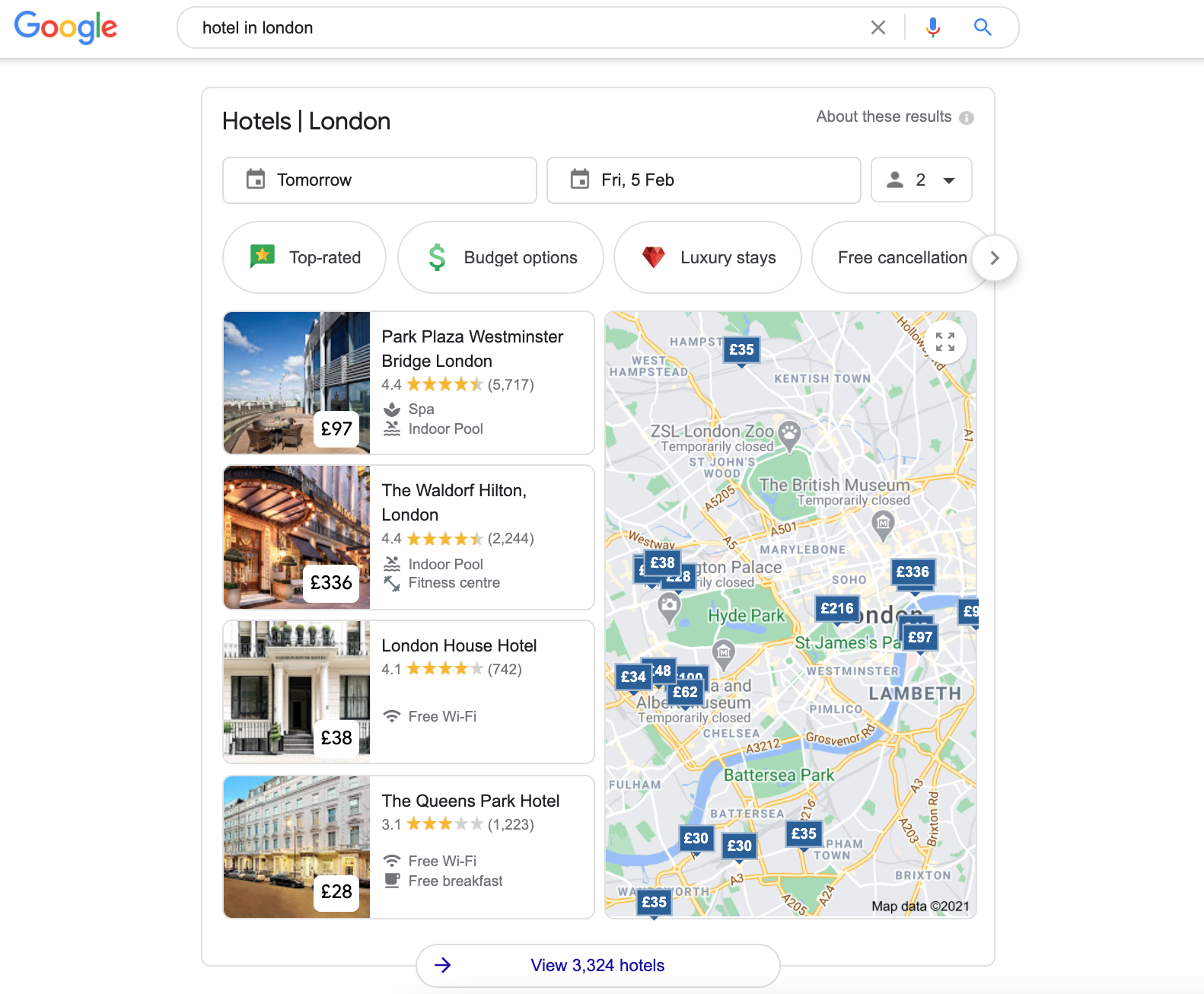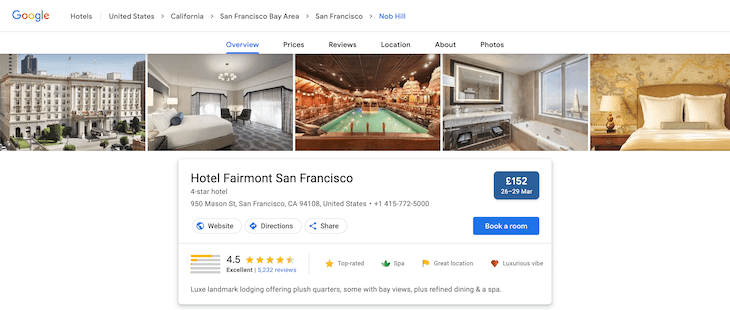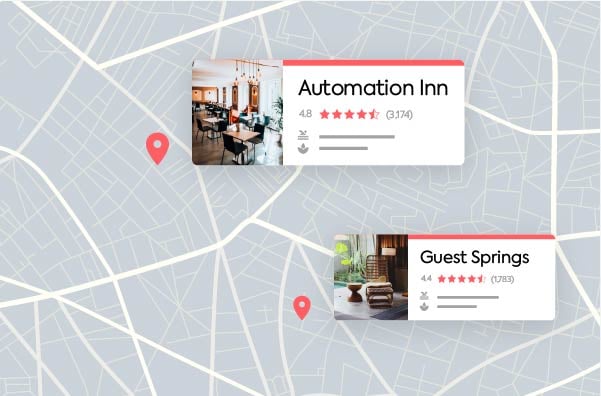Table of contents
When a traveler is researching which hotel to stay at, one of their first ports of call is to Google: “hotel in [destination]”.
This is shown by the fact that the term “hotel in New York” is searched around 271,000 times each month. Popular tourist cities like Dubai and London also have over a quarter of a million monthly searches for this type of keyword.
That’s an extraordinary volume of traffic that your hotel could be reaching. Particularly in a year where travel trends will continue to be unpredictable, maximizing visibility through channels like Google is a no brainer. Let’s get into the specifics.
When a user makes this type of search, Google first delivers them a Google Map embedded with various hotels. You can see an example below:

This is prime real estate. For searches of this type, the four results to the left of Google’s map get the majority of the clicks. This is especially true of searches made on a mobile device, as they take up even more of the available space on smaller screens. So how do you get your hotel to show here?
Google has its own specific algorithm when assessing which hotels appear beside its map, meaning that the type of search engine optimization that gives you the best ROI as a hotel owner differs slightly from your typical SEO play.
Here are the factors that you should focus on when optimizing your hotel’s online presence for the Google map.
Make sure that your Hotel’s Google My Business listing is as complete as possible
Google populates its map with data from the Google My Business profiles of local hotels. Therefore, when it comes to optimizing a hotel for Google’s map, the battle is won and lost through optimizing your Google My Business listing rather than your hotel’s website.
Google evaluates which hotels it shows on its map based on two goals:
- The search engine wants to deliver its users accurate and useful information.
- It wants to present users with results that it thinks has the best chance of driving clicks and bookings.
Google are transparent about the fact that they make money when people make a booking through the results on its map. Therefore, hotels with Google My Business listings that are set up in a way that entices bookings will appear more prominently on the map.
So, how do you build out your Google My Business listing in this way?
Well, there’s no big secret to it other than to make your listing as detailed and “complete” as is possible. When you first claim and create your listing, there are a huge number of fields to fill out. This ranges from very basic information such as your hotel’s address and phone number, right the way through to your specific amenities and photos of your hotel.
Due to the (let’s be honest here) tedium of filling out all these fields, many fall into the temptation of viewing setting up their Google My Business profile as a simple box-ticking exercise. They fill in only the fields that are required to get a profile set up and then move on to working on their website.
This is the wrong approach. Due to the vast amount of clicks that the Google Map gets relative to organic search results for hotel-related queries, time spent filling out your Google My Business listing will generate a far higher return on investment than optimizations made to your hotel’s website.
When someone clicks on your hotel’s listing in the map, they are taken to a page that contains all the details that you have entered when making your listing:

This information is what drives people to make a booking. Therefore the richer the information is, the more likely people are to click the “book a room” button. It is only at this point that Google makes money from listing your hotel. The people who create Google’s map algorithm are aware of this fact, and therefore design the algorithm to give greater exposure to Google My Business profiles that have all this information filled out.
The importance of having a fully filled out Google My Business profile actually goes a step further than this.
Google offers searchers the opportunity to filter hotels by certain criteria. These criteria include a minimum price per night and whether the hotel offers certain amenities. Google can only include your hotel in these filters if you have declared this information in your Google My Business listing. Failure to do this will therefore mean that you don’t appear for these filtered searches.
Get your hotel listed on all available booking platforms
Remember our earlier point that Google wants to do everything in its power to avoid giving users inaccurate information? Well, one of the most vital pieces of information that the search engine wants to get right is the location of your hotel.
While Google’s main source of this information is your hotel’s Google My Business listing, the search engine “double-checks” the veracity of this with other online sources that contain this basic information about your hotel.
One of the most obvious places to look for this information is on third party booking platforms. Therefore the more of these booking platforms that your hotel is listed on, the more evidence Google has to believe that your hotel does indeed exist at its given location. While not being listed on the odd booking platform may not seem important, Google Map SEO is a game of fine margins, so make sure that you are listed on as many third-party booking platforms as possible – as long as their terms and margins are acceptable to your business, of course.
Other places where you can list your hotel’s name, address, and contact details, such as directories, can also provide this type of “evidence” to Google. When you fill these out, take care to ensure that your address is 100% consistent across all these platforms. Google is not yet sophisticated to understand abbreviations such as St. and Ave. Having such abbreviations on some platforms but not on others can cause confusion as to where your hotel is located, meaning that Google will have less confidence in listing your hotel at the top of its map listings.
Google reviews are more important than ever
We all know that collecting Google reviews is vital to the online strategy of a hotel. The consistent collection of (hopefully positive) Google reviews can improve your prominence in the Google map for two reasons.
Firstly, Google gives a lot of weighting to a hotel listing’s “click-through rate” in its map algorithm. “Click-through rate” refers to the number of times one listing is clicked through compared to other listings for a specific search. If one listing is clicked significantly more often than others, this tells Google that it is the best result for that search. The listing is therefore rewarded with more exposure in the future.
A hotel with a huge number of positive reviews will likely be clicked on more often than ones that have a lesser number. Collecting these reviews is the most efficient way of improving your click-through rate.
The second reason why collecting Google reviews is so important for your prominence on the map is that it helps with your map rankings for searches of the format “best hotel in [location]”. Again, Google wants to give the most accurate results for these types of searches, and arguably the most reliable source of data that it has for one hotel being better than another is a hotel’s quantity and quality of Google reviews. Better reviewed hotels are therefore seen as a better fit for these types of searches.
The importance of a mixed strategy
If there is one key takeaway of all this information it’s that search engine optimization for hotels should focus on optimizing Google My Business profiles. Although many hoteliers would like to see a world without OTAs, third-party booking sites still play an important role in bringing in business, so don’t put all your eggs in the basket of your own website – no matter how good your hotel booking engine.
This is evident if you make hotel based queries in Google and look at where the websites of hotels rank. In popular destinations, the websites of actual hotels start ranking somewhere on the second page of Google. Booking platforms build their whole business around search engine optimization, and Google will always position itself so that it makes the most money from search. As hotel owners and managers, you’d be wise to adapt their strategy to fit in with this, rather than fight against it.
About the author: Oli Graham is the Marketing Manager for copywriting agency RightlyWritten.

Author
Oli Graham
Oli Graham is the Marketing Manager for copywriting agency RightlyWritten.

Essential hotel technology for general managers
Download now
Hospitality hot takes straight to your inbox


.webp)